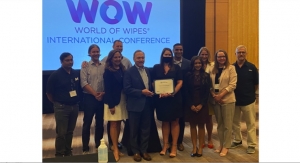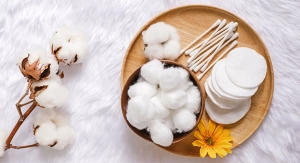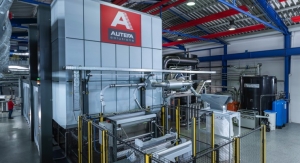Tara Olivo, associate editor06.18.18
During the World of Wipes International Conference in Chicago, fiber producer Lenzing announced VEOCEL as its new nonwoven specialty brand of fibers. The rebranding is intended to position VEOCEL as a premium brand of nonwoven fibers for daily care rituals, covering a range of applications from baby care, beauty and body care to intimate care and surface cleaning. VEOCEL fibers are certified clean and safe, biodegradable, from botanic origin and produced in an environmentally responsible production process.
The launch of VEOCEL is part of Lenzing’s strategy to transform from a business-to-business (B2B) fiber producer to a business-to-business-to-consumer (B2B2C) brand.
Around four years ago, Lenzing executives wanted to develop a new branding strategy due to difficult market situations, according to Marco Schlimpert, Lenzing’s senior vice president Europe & Americas. “There are a lot of fibers we sell in the nonwovens and textile industries, but on a daily basis people don’t recognize it, and they don’t see the features we are offering. That’s the reason why we said we needed to go from B2B marketing to a ‘B2Me’ approach. To elevate the fiber from the technical specification to the purpose and the value the end consumer would perceive,” he explains.
Therefore, Lenzing decided to position its fibers in a different way and distinguish between the textile industry and the nonwovens industry. Now, Lenzing’s textile fibers will fall under the TENCEL brand, while the nonwovens fibers will be part of the VEOCEL portfolio.
“These are all the specialty fibers that we are producing in our production footprint, which we have produced also in the past, but in the past we marketed in a different way, such as a substitute of cotton, but that’s not true because the properties we’re offering with our fibers are much more enhanced than just any other fiber,” Schlimpert says.
The VEOCEL fiber portfolio includes VEOCEL Lyocell and VEOCEL Specialty Viscose fibers, which are derived from renewable or sustainable wood sources from certified and controlled forests and plantations. The botanic origin of the fibers offers functional benefits such as improved moisture absorbency and management, contribution to breathability, good hand feel, blending versatility, and all VEOCEL fibers are certified biodegradable in soil, landfill, compost and seawater.
As an example, VEOCEL’s unique properties can be demonstrated in the flushable wipes market. “If you take flushability and strength, usually these are two properties that are completely opposite, but we can combine them like nobody else can do with other fibers. This offers features that are unique,” he notes.
Coupled with ongoing co-branding, joint marketing and brand education initiatives conducted with customers and brands globally, VEOCEL will enable Lenzing to shift its focus beyond fiber types to product application and build a relatable and emotional connection with consumers.
“What we are now doing in the nonwovens industry, as we have done for the textile industry for the past 15 years, is to position these highly valued technical properties with traceability, with sustainable ecological production, and to create emotions for the end consumer. So when the end consumer goes to Walmart, Costco, or wherever, and they see a range of different offerings, they think, ‘okay, here’s a brand I trust,’” Schlimpert says.
Lenzing hopes consumers will soon associate VEOCEL with the company’s stringently monitored production process in accordance with its high quality, environmental and safety standards. According to Schlimpert, Lenzing’s site in Austria is the biggest integrated pulp and fiber manufacturing plant in the world, which also happens to be surrounded by pristine lakes and mountains and is one of the most well known regions for taking vacations in Austria, with clear water, a clear sky and a clear environment. Lenzing also operates the biggest single installed wastewater treatment plant in Austria. “We clean the water that way so that afterwards [the nearby lake] is a fisherman’s paradise,” he adds.
This is why VEOCEL’s tagline “purely for you” has a double meaning, Schlimpert says. It’s not only pure because it is good quality, but when a consumer buys it, they make a conscious decision to buy something that’s been produced by a company that cares about its environmental footprint.
Alongside the launch of the VEOCEL brand, Lenzing announced an addition to its Surface portfolio—the VEOCEL Lyocell Fiber with “Quat” Release technology. The new fiber is a premium and specialty wood-based cellulose fiber that is used in hard surface cleaning and disinfectant wet wipes. VEOCEL Lyocell fibers with Lenzing’s Quat Release technology allow quaternary ammonium compounds, also known as “Quat”, to be released from wet wipes onto the surface for effective cleaning and disinfecting in household and industrial environments.
According to Lenzing, the majority of single-use cleaning and disinfectant wet wipes mainly consist of synthetic fibers such as polyester and polypropylene. This binding interaction substantially decreases the release of “Quat” and can negatively impact the efficacy of the disinfectant product. However, with Lenzing’s “Quat” Release technology, the binding of “Quat” to the surface of VEOCEL Lyocell Fibers is significantly reduced, resulting in improved effectiveness of surface cleaning and the disinfection process.
Wet wipes containing VEOCEL Lyocell Fiber with “Quat” Release technology demonstrate significantly improved release of “Quat” from the wet wipe to the surface, resulting in improved product stability and performance, according to Lenzing. In addition, VEOCEL Lyocell fibers also promote good absorbency, homogenous distribution of liquid in wet wipes and good hand feel.
During a presentation on the new fibers, Lenzing’s project manager - product R&D Martina Opietnik described the most notable advantages of VEOCEL Lyocell Fiber with “Quat” Release technology. “Commonly used [in hard surface cleaning and disinfectant wipes] are synthetic fibers, but we now have this innovative fiber which is biodegradable, of botanic origin that comes from cellulose and has an increased ‘Quat’ release property that is significantly more than most other natural cellulose fibers,” she said.
TENCEL™, VEOCEL™ are trademarks of Lenzing AG.
The launch of VEOCEL is part of Lenzing’s strategy to transform from a business-to-business (B2B) fiber producer to a business-to-business-to-consumer (B2B2C) brand.
Around four years ago, Lenzing executives wanted to develop a new branding strategy due to difficult market situations, according to Marco Schlimpert, Lenzing’s senior vice president Europe & Americas. “There are a lot of fibers we sell in the nonwovens and textile industries, but on a daily basis people don’t recognize it, and they don’t see the features we are offering. That’s the reason why we said we needed to go from B2B marketing to a ‘B2Me’ approach. To elevate the fiber from the technical specification to the purpose and the value the end consumer would perceive,” he explains.
Therefore, Lenzing decided to position its fibers in a different way and distinguish between the textile industry and the nonwovens industry. Now, Lenzing’s textile fibers will fall under the TENCEL brand, while the nonwovens fibers will be part of the VEOCEL portfolio.
“These are all the specialty fibers that we are producing in our production footprint, which we have produced also in the past, but in the past we marketed in a different way, such as a substitute of cotton, but that’s not true because the properties we’re offering with our fibers are much more enhanced than just any other fiber,” Schlimpert says.
The VEOCEL fiber portfolio includes VEOCEL Lyocell and VEOCEL Specialty Viscose fibers, which are derived from renewable or sustainable wood sources from certified and controlled forests and plantations. The botanic origin of the fibers offers functional benefits such as improved moisture absorbency and management, contribution to breathability, good hand feel, blending versatility, and all VEOCEL fibers are certified biodegradable in soil, landfill, compost and seawater.
As an example, VEOCEL’s unique properties can be demonstrated in the flushable wipes market. “If you take flushability and strength, usually these are two properties that are completely opposite, but we can combine them like nobody else can do with other fibers. This offers features that are unique,” he notes.
Coupled with ongoing co-branding, joint marketing and brand education initiatives conducted with customers and brands globally, VEOCEL will enable Lenzing to shift its focus beyond fiber types to product application and build a relatable and emotional connection with consumers.
“What we are now doing in the nonwovens industry, as we have done for the textile industry for the past 15 years, is to position these highly valued technical properties with traceability, with sustainable ecological production, and to create emotions for the end consumer. So when the end consumer goes to Walmart, Costco, or wherever, and they see a range of different offerings, they think, ‘okay, here’s a brand I trust,’” Schlimpert says.
Lenzing hopes consumers will soon associate VEOCEL with the company’s stringently monitored production process in accordance with its high quality, environmental and safety standards. According to Schlimpert, Lenzing’s site in Austria is the biggest integrated pulp and fiber manufacturing plant in the world, which also happens to be surrounded by pristine lakes and mountains and is one of the most well known regions for taking vacations in Austria, with clear water, a clear sky and a clear environment. Lenzing also operates the biggest single installed wastewater treatment plant in Austria. “We clean the water that way so that afterwards [the nearby lake] is a fisherman’s paradise,” he adds.
This is why VEOCEL’s tagline “purely for you” has a double meaning, Schlimpert says. It’s not only pure because it is good quality, but when a consumer buys it, they make a conscious decision to buy something that’s been produced by a company that cares about its environmental footprint.
Alongside the launch of the VEOCEL brand, Lenzing announced an addition to its Surface portfolio—the VEOCEL Lyocell Fiber with “Quat” Release technology. The new fiber is a premium and specialty wood-based cellulose fiber that is used in hard surface cleaning and disinfectant wet wipes. VEOCEL Lyocell fibers with Lenzing’s Quat Release technology allow quaternary ammonium compounds, also known as “Quat”, to be released from wet wipes onto the surface for effective cleaning and disinfecting in household and industrial environments.
According to Lenzing, the majority of single-use cleaning and disinfectant wet wipes mainly consist of synthetic fibers such as polyester and polypropylene. This binding interaction substantially decreases the release of “Quat” and can negatively impact the efficacy of the disinfectant product. However, with Lenzing’s “Quat” Release technology, the binding of “Quat” to the surface of VEOCEL Lyocell Fibers is significantly reduced, resulting in improved effectiveness of surface cleaning and the disinfection process.
Wet wipes containing VEOCEL Lyocell Fiber with “Quat” Release technology demonstrate significantly improved release of “Quat” from the wet wipe to the surface, resulting in improved product stability and performance, according to Lenzing. In addition, VEOCEL Lyocell fibers also promote good absorbency, homogenous distribution of liquid in wet wipes and good hand feel.
During a presentation on the new fibers, Lenzing’s project manager - product R&D Martina Opietnik described the most notable advantages of VEOCEL Lyocell Fiber with “Quat” Release technology. “Commonly used [in hard surface cleaning and disinfectant wipes] are synthetic fibers, but we now have this innovative fiber which is biodegradable, of botanic origin that comes from cellulose and has an increased ‘Quat’ release property that is significantly more than most other natural cellulose fibers,” she said.
TENCEL™, VEOCEL™ are trademarks of Lenzing AG.









